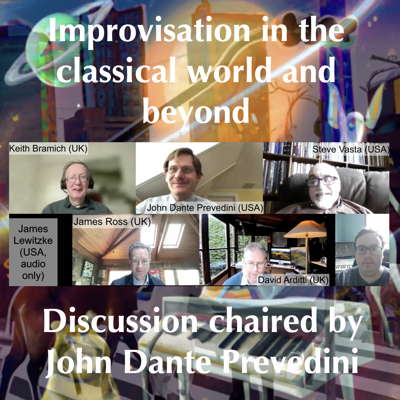 LISTENING TO TCHAIKOVSKY: Béla Hartmann uses his knowledge of Eastern Europe to argue against the banning of all Russian culture following Vladimir Putin's invasion of Ukraine.
LISTENING TO TCHAIKOVSKY: Béla Hartmann uses his knowledge of Eastern Europe to argue against the banning of all Russian culture following Vladimir Putin's invasion of Ukraine.
 DISCUSSION: John Dante Prevedini leads a discussion about Improvisation in the classical world and beyond, including contributions from David Arditti, James Lewitzke, James Ross and Steve Vasta.
DISCUSSION: John Dante Prevedini leads a discussion about Improvisation in the classical world and beyond, including contributions from David Arditti, James Lewitzke, James Ross and Steve Vasta.
 SPONSORED: Think of Something Beautiful - Malcolm Miller pays tribute to contralto Sybil Michelow (1925-2013).
SPONSORED: Think of Something Beautiful - Malcolm Miller pays tribute to contralto Sybil Michelow (1925-2013).
All sponsored features >>

A Change of Direction
French music by Debussy, Dukas and Roussel, played by the Royal Liverpool Philharmonic Orchestra and Domingo Hindoyan, enjoyed by GEOFF PEARCE
'... stellar performances ...'
This is a great disc released on the Onyx label featuring a conductor I had not heard of, Domingo Hindoyan. If the quality of these performances is anything to go by, I suspect that we shall hear a great deal more of this conductor, Venezuela born, and a graduate of the famed El Sistema mysic system before training in Europe. He is now the chief conductor of the Royal Liverpool Philharmonic Orchestra.
The late nineteenth and early twentieth centuries saw a real change of direction of French music, and the works recorded here represent that change. There was an interest in the music of Asia generally, including various scales that made their way into some of these composers' works, and a fascination with the 'East' generally. This is also reflected in orchestral colour and often sensuous subject matter.
The disc opens with Debussy's poème dansé or 'danced poem', Jeux, written for Diaghilev and the Ballets Russes in 1912 and first performed the following year. It depicts the search by a boy and two girls for a tennis ball, on an early evening in summer. They embrace only to disappear into the darkness of the garden when a second tennis ball is thrown towards them by an unknown person. The music is mysterious, at times playful, and always atmospheric. The performance here is very fine, as is the recording quality, and the orchestra responds to the quick changes of mood, to bring this colourful score to life. There are about sixty changes of tempo in this work, so it demands utmost concentration to bring it off. This is only the second time I have heard this work, which is not performed nearly as often as it should be.
Listen — Debussy: Jeux
(ONYX4224 track 1, 6:46-7:34) ℗ 2022 Onyx Classics :
Albert Roussel (1869-1937) is somewhat under-represented in concert programmes and recordings these days. This is a pity, as he is a very fine composer indeed. Whilst his output is not large, it does encompass a wide range of genres, and he was an important teacher of Martinů, a composer I am particularly fond of.
Roussel wrote a two act ballet in 1931, his Opus 43, Bacchus and Ariadne. This recording features the second suite, drawn from the second act of the ballet. This suite is in seven short movements and the plot is loosely described in the accompanying booklet.
Listen — Roussel: Moderato (Bacchus and Ariadne)
(ONYX4224 track 3, 1:30-2:18) ℗ 2022 Onyx Classics :
The movements are quite contrasting and colourful, reflecting the story, and they range from quiet despair to passion and seduction. The work ends with a bacchanal.
Listen — Roussel: Allegro brillante (Bacchus and Ariadne)
(ONYX4224 track 8, 0:00-0:46) ℗ 2022 Onyx Classics :
The all-time favourite Prélude à l'après-midi d'un faune by Debussy, an evocative depiction of a Mallarmé poem of the same name, was first performed in 1894. It was Debussy's first orchestral masterpiece, and arguably his most popular work today. 'Music is a dream from which the veils have been lifted,' wrote Debussy while working on his Prélude. 'It's not even the expression of a feeling; it's the feeling itself.' This performance is quite lovely: Cormac Henry is a very fine flautist and his delivery is perfection. He is supported here by fine playing from the rest of the orchestra, beautiful woodwind solos, detailed brass playing and a lush carpet of strings. This is as fine a performance as you will hear anywhere.
Listen — Debussy: Prélude à l'après-midi d'un faune
(ONYX4224 track 9, 8:00-8:54) ℗ 2022 Onyx Classics :
La Peri by Paul Dukas (1865-1935) is one of the composers' few works to survive because the composer was very self critical and destroyed much of his work. La Peri (1912) was his last major orchestral work. It is short, consisting of a small fanfare and Poème dansé. The work describes young Persian Prince Iskander (Alexander the Great)'s search for the lotus flower of immortality, and his encounter with La Peri (The fairy). After being exalted that he found the flower, he steals it from La Peri, only to have it taken from him by its rightful owner, after it had been altered by the creator spirit Ormuzd. Iskander, resigned, awaits to die. I have another recording of this work, and have always enjoyed the colour and exotic nature of this music. I have always regretted that Dukas destroyed so much of his music, if the quality of La Peri and L'Apprenti sorcier are anything to go by.
Listen — Dukas: La Peri
(ONYX4224 track 11, 11:56-12:41) ℗ 2022 Onyx Classics :
If you are a lover of French music from the last few years of the nineteenth and early twentieth century, this is the disc for you. There is one well known work and three works that are not performed or recorded as often, and they receive stellar performances from this very fine orchestra and conductor. The programme notes, although short, are informative and the recording quality is very pleasing.
Copyright © 28 August 2022
Geoff Pearce,
Sydney, Australia

CD INFORMATION: DEBUSSY, DUKAS, ROUSSEL / DOMINGO HINDOYAN


